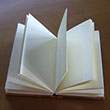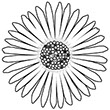Sometimes objects, events, or persons keep haunting our memories without apparent reason. They are emblazoned on our mind with vivid clarity, but we do not know why. I have come to believe that these memories are no accidents. I believe that recurrent memories are expressions of an inner force telling us that we have tasks to undertake. We let this mechanism guide us every day in the context of practical requirements we immediately recognize. But we may dismiss memories that recur without apparent reason because we have difficulties to identify what they mean. Our lack of understanding does not make such messages less significant. I believe we memorize and send them to ourselves because we realize on some level that they are significant. Only, for some reason, we might not be ready to deal with them at the time the memory is created. That we do not comprehend how such memories fit into our pursuits may demonstrate that there is more to explore for us or that we distanced ourselves from memorized occurrences because we deemed ourselves unable of addressing them earlier. Either way, we might leave needs or wishes unpursued. As I described in the Introduction of my book, its content is the result of one such reminder. But placing my philosophical insights into public view seems to be the result of yet another of such recurring reminders.
When I was a young boy, one of my mother’s friends gave her a remarkable book for her birthday. It was a big, beautifully embossed, fragrant, leather-bound book. When my mother opened it, the pages were empty. I remember my great surprise. I thought a mistake had been made. Somehow, the printer had missed this book. How embarrassing for the lady who gave the gift. But my mother seemed delighted – an obvious pretense, I thought. After she and her friends left to sit in the garden, I looked through this book to see whether anything could be found in there. Nothing. Still, I was fascinated by this mysterious book. For reasons that I could not explain, I wanted to possess it. I knew this was no ordinary stock of empty pages to be used for drawing or crafting. Its elaborate and important-looking cover, its pristine, thick, high-quality, eggshell, handcrafted paper that carried the air of fresh pressed linens, and its neat binding and precise cut portrayed a preparatory setting that called for content. Yet I could not think of a fitting use for it. I was so focused that I did not hear my mother coming back. She told me to put the book down, probably out of concern I would put smudges on it with my grubby little hands that touched a lot of substances back then that could have left evidence of my handling. I complied but decided to look further into this mystery.
Later that day, after my mother’s friends had left, I asked her what this book was for. She explained that it was a place to write experiences and ideas so one could remember them later. This answer did not make sense to me. Committing impressions to paper for one’s own use was foreign to me. Apart from the composition of shopping lists, I had never seen anybody do that. Also, I could not think of a reason why one would want to spend time and effort on such an undertaking. I felt no requirement to write things down because I could remember everything. I discounted the idea as a symptom of grownups’ pathology because I had heard some of them talk about their problems with remembering. But I also thought that drawing attention to such deficiencies by writing impressions into a precious book was a sad waste. I thought if they could not recall what they wrote, it could not be that important. It made more sense to use writing for communicating with others. This was familiar to me because my mother frequently wrote and received letters. But a book would fail the give and take of communicative interaction. With no other purpose appearing to be logical, I was reduced to compare the empty book with printed books.
For an instant, I considered my children’s books. But these were clearly of a less substantial and different sort. I recognized that the demeanor of the empty book compared more to the books for adults displayed on a shelf that covered one wall of our living room. The exterior of these books had always fascinated me. One of my earliest memories is playing with some books that I could reach on the front shelf of a desk. Their rectangular shapes and the colors, graphic embellishments, and binding materials made them look like fancy building blocks. I also remember taking in the smells and feel of different papers, printing, lamination, and binding. As I had learned to read, I had come to understand that there was more to these books. They bore often enigmatic titles. I had looked into some of them and quickly lost interest because there was much to read, much I did not comprehend, and not enough interesting content to make the struggle seem worthwhile. I pitied adults for not having pictures in most of their books and having to read hundreds of pages. Yet, although I was not too interested in their content now, I had the sense that this might change. My mother was an avid reader. Her intense, reverential, and considered handling of these books signaled to me that their content was precious. This made me believe that I had some immaturities in my capacities to access them properly and that this was something I would grow into and would be able to master and appreciate later in life. I thus had continued my reading attention to picture and comic books, little adventure books for children, and the TV program guide.
I remember being prompted to think deeper about grownup books once I saw the empty book presented to my mother. Up to that moment, I had not given much thought to how books came about. I knew that someone put the writing in them, but I had viewed that as a technical activity of placing letters and words on the pages very much in the vein of how television, film, or photography worked. I had not thought much about the fact that books begin with someone sitting down, formulating concepts and sentences, and committing them to a medium. My confrontation with the empty book brought that process into stark focus. I pondered the audacity of such an undertaking. The dignity of a book required content to match it. It implied an obligation to write a work of sufficient interest so that others would buy and read it. I also considered how much more difficult it would be to compose a book than to write the essays I had to deliver for school or a letter. I thought it possible to fill a book with a collection of stories or descriptions. I had seen samples of this in fairytale collections and books about nature, history, and technology or encyclopedias. But I was awed by the idea that someone could fill an entire book with a continuous subject, although I was not ready to commit to reading such a book. The empty book represented a challenge to me to write a book. If I had possession of the empty book, I would have everything technically needed for such an enterprise. I decided that if my mother would let me have it, I would keep it safe until I had something worthy of committing to it. When I asked her a few days later, she quickly denied my request. The empty book was placed on a lower rung of the bookshelf. It stayed there for many years, unused. For all I know, it might still be there. I kept looking at it from time to time. In a way, I was relieved it was not mine because I felt I was still not ready to answer its challenge. Eventually, I lost interest in it. Soon, the story surrounding the book faded in my mind and so did my related resolution to one day write a worthy book. And yet, the theme never completely left my mind. It kept silently percolating, sometimes tipping the surface of my awareness to submerge again for extended periods. For the longest time, this was just an odd childhood fragment among others that circulated in my memory, seemingly without connection.
It was only a number of years ago that I began to ask and try to understand what this memory might be about. The image of the unwritten book became increasingly prominent in my mind. Was I the unwritten book? Was it a metaphor for my life? Was I to fill the book with my activities or literally with writing? I began to think that maybe it was all of the above. But there was definitely something in my mind that incited me to write a book. What I should write took some time to transpire and had an apparently unconnected origin. When I began to write about the philosophy of happiness, I had no concept I was writing a book. I thought I would write an essay about the nature of happiness. It was initially rather unclear to me why I would even do that. Somehow, it seemed the right thing to do. A purpose only crystallized after I began writing. The development of my thoughts and the accumulation of pages containing them surprised me. After I had written the first dozen pages, I thought that there might be another ten or so in me. Yet, as I proceeded writing, I discovered that there was much more trying to find expression and that there was much potential for further advancement for my ideas. Thus, my manuscript steadily grew. I wrote every day with very few exceptions and committed full working days to my task. I never sat in front of the computer looking for inspiration. Although the tracing, formulation, and assembly process was difficult at times, I had the feeling that I was following something that was already there, that I was only discovering it and cleaning it up to be seen by the world. I increasingly had the sense that I was not creating but assisting matters that existed independently to manifest themselves through my efforts. The almost trance-like, unquestioning assuredness with which I followed the developments of the subject matter in my mind even when I did not know where it would lead remains somewhat of a mystery to me even though it can be explained as a logical progression and correlation of my ideas.
Looking back now that the book has emerged, I can explain why the concept of the unwritten book had continued flashing through my mind. It only consciously joined with the recording of my ideas when I realized that they commanded the format of a book. I only discovered what the vision of the empty book was about after its subject began to materialize. It appeared to my conscious mind more like an explanation after the fact than an antecedent motivation. Then again, I had the feeling that my unconscious might have pushed the agenda connected to this vision all along once I began writing about a subject it considered worthwhile. It may even have instigated that I began writing once it identified my ruminations about happiness as potentially meaningful. I still cannot fathom how there could and why there should be such a powerful, even defining inspiration going back to my early life. Sometimes, it seems like a happenstance that materialized upon a coincidental opportunity. Whatever the demand represented by the idea of the unwritten book was has been satisfied because the reminders ceased after I started writing. Still, the impact of that idea makes me wonder what else is in there, sending me messages about what I am supposed to do. I will have to look into that.
An Unwritten Book
click daisy to return to
Reflections table of contents
close
menu

back to top
© 2013-2025 BY MARTIN JANELLO

